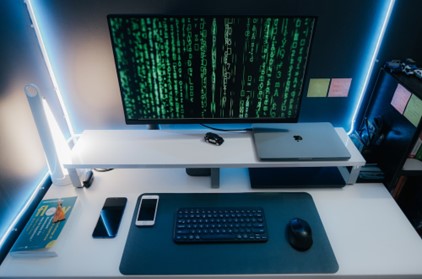Artificial intelligence technologies are on the rise and changing how we live and work. However, as it becomes increasingly sophisticated, AI may help cyber criminals enact targeted cyber-attacks to businesses. Targeting the “right kind” of business could have major effects, like influencing the economy and politics. Consider the following:
Enhanced Offensive Capabilities
AI enables attackers to launch more sophisticated and targeted cyber-attacks. Adversarial AI techniques can be used to bypass traditional security measures, making it harder to detect and defend against attacks. For example, the Colonial Pipeline attack in May 2021, attributed to the DarkSide ransomware group, disrupted fuel supplies along the U.S. East Coast. This attack highlighted the potential for AI-powered attacks to impact critical infrastructure and disrupt essential services.
Automation of Attacks
Attackers can leverage AI algorithms to automate reconnaissance, vulnerability scanning, and the deployment of malware. By automating and streamlining various stages of cyber-attacks, attackers can execute large-scale attacks with minimal human intervention. Consequently, this automation allows for a higher frequency of attacks, increasing the potential for economic and political disruption.
Expanding Attack Surface
The proliferation of AI technologies introduces new attack vectors and vulnerabilities. Various sectors use AI tools in their day-to-day operations, including finance, healthcare, transportation, and energy. As a result of its widespread adoption across industry, the attack surface has been broadened. Therefore, adversaries have more opportunities to exploit vulnerabilities in AI systems and compromise critical infrastructure.
Advanced Persistent Threats (APTs)
APTs are sophisticated, long-term cyber campaigns typically conducted by nation-state actors for intelligence gathering, economic espionage, or political manipulation. AI-powered APTs have the potential to amplify the impact and effectiveness of these campaigns. Cyber criminals may use AI to automate reconnaissance, adapt attack techniques based on target responses, and evade detection, and accordingly makes APTs stealthier and more persistent.
Economic Implications
The integration of AI in businesses brings economic advantages, but it also introduces new risks. Cyber-attacks on companies can lead to financial losses, damage to reputation, and erosion of customer trust. Moreover, the potential for AI-enabled intellectual property theft can undermine innovation and economic competitiveness, affecting industries and national economies.
Political Influence and Disinformation
People have been spreading disinformation since the dawn of time and highly realistic fake content is the latest iteration of that trend. AI tools make it easier and more accessible for anyone to create and disseminate this content. Deepfakes, text generation, and social media manipulation could have significant implications for political campaigns, elections, and public opinion. AI-powered disinformation campaigns may be leveraged to exploit social divisions, spread false narratives, and manipulate public sentiment, and as a result, undermining democratic processes and stability.
Conclusion
To stay ahead of this changing world, governments, organizations, and cybersecurity professionals need to enhance their capabilities and defenses. This includes investing in AI-powered security solutions, fostering collaboration between industry and government, improving incident response capabilities, promoting international cooperation, and establishing regulations and standards to ensure the responsible and ethical use of AI technologies.





